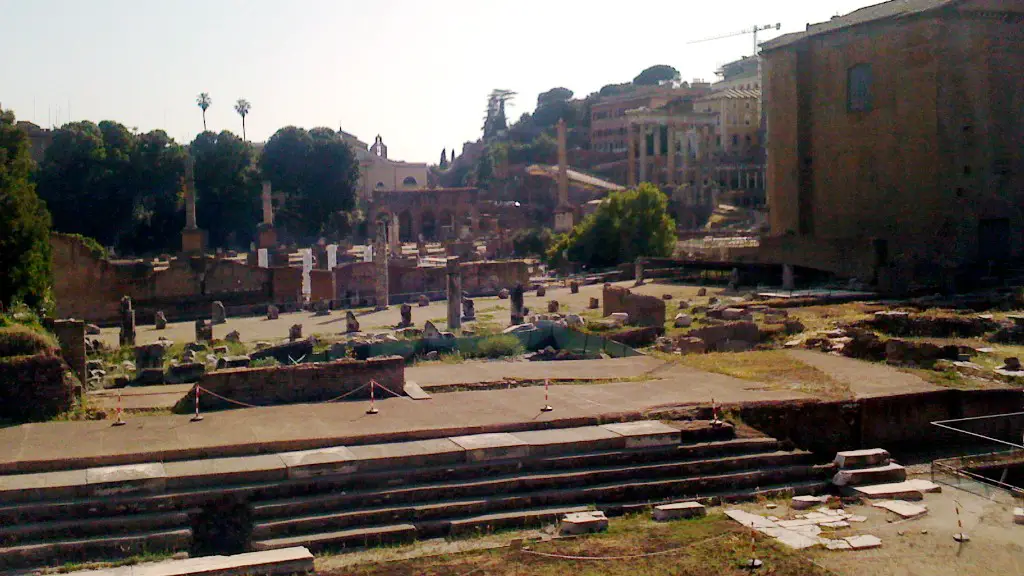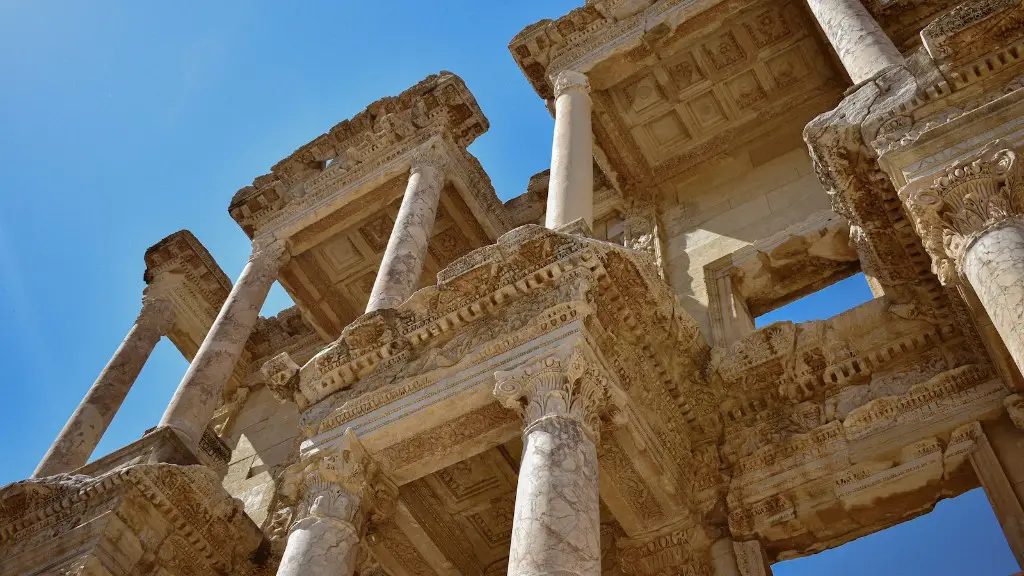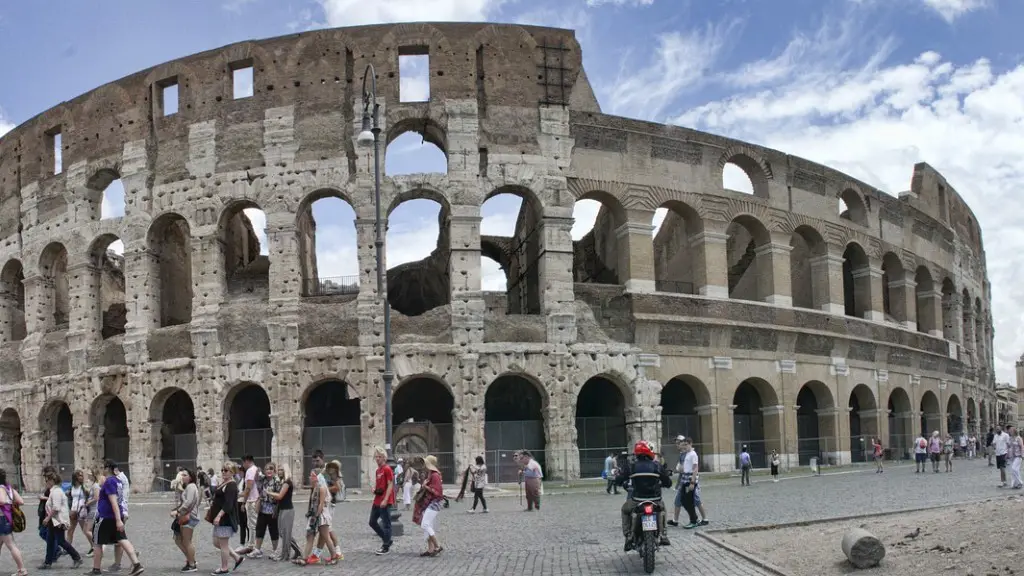Ancient Rome was a powerful and influential state, renowned for its legal system, art and architecture, as well as its services. The Roman civil service was one of the most efficient civil administrations in world history. It was the backbone of the Roman government and society, a bureaucracy that provided public order, justice, peace and security.
It is believed that the Roman civil service followed a system known as the cursus honorem, which is Latin for ‘the course of honor’. The cursus honorem was an established order of titles and offices which enabled individuals to acquire the skills and qualifications necessary to handle important matters of state. This system allowed capable and experienced individuals to ascend the ranks of the Roman civil service.
The Roman civil service was governed by three principles: promotion based on merit rather than connections to influential families, clear division of labor with each individual having a specific area of expertise, and strict discipline. Every member of the Roman civil service was expected to adhere to the highest standards of professionalism.
In addition to providing the essential infrastructure and services needed for the efficient operation of day-to-day life, the Roman civil service also managed the complex political, economic and social structures of the empire. Its administrators supervised the construction of roads and bridges, maintained records of public and private property, collected taxes and managed public works projects.
Despite its successes, the Roman civil service was far from perfect. It was severely criticized for its inefficiency and lack of compassion, and was often accused of corruption and greed. Despite the criticism, the Roman civil service had many achievements that still influence the way governments operate today.
For example, the reign of Augustus saw wide-sweeping reform to the Roman civil service. Augustus codified the law so that everyone was equal before it, while also reorganizing and improving the civil service. He created the Praetorian Guard and instituted a policy of appointing proven and experienced individuals to administrative posts rather than relying on patronage.
Civil Service in Ancient Rome: Role of Taxation
Taxation was an important part of the Roman civil service, and it allowed the government to fund public works and other essential services such as education and the military. Taxation in Ancient Rome was based on a system of tithes and direct taxation. Farm incomes, inheritances and commercial profits were taxed, while agricultural products and goods in transit were subject to tolls.
The government also levied poll taxes, which were a flat rate paid by all citizens regardless of their wealth. Taxation in Ancient Rome was complex and rigorous, and it was often a source of resentment among the Roman people. This resentment was only exacerbated by the increasing demands of the Roman civil service.
Civil Service in Ancient Rome:Role of the Senate
The Roman Senate was an important part of the Roman civil service, and it played an important role in the management of the government. The Senate was made up of wealthy, influential and educated Roman citizens, and it was responsible for advising the Emperor and passing laws. The Senate also had the power to declare war and peace, as well as make treaties. It was an advisory body, however, and its decisions could be overruled by the Emperor.
The Senate was a major force in the Roman civil service and its decisions had a profound effect on the Roman people. The Senate was seen as a trusted institution and it held a powerful position in Roman society. Its members were respected for their wisdom and experience, and they played an important role in the government of the Roman Empire.
Civil Service in Ancient Rome:Role of the Roman Law
The Roman civil service was highly regulated and organized, and it was underpinned by Roman law. Roman law was based on a set of codified principles and legal precedents, which were enforced by the use of judicial systems. Roman law enabled the Roman civil service to better administer and manage the various aspects of Roman society by providing a code of laws enforced by the government.
The Roman civil service relied heavily on the use of Roman law to regulate and manage the activities of its citizens. Roman law was based on principles such as justice, fairness and obedience to the Emperor and his laws. It was stricter than those used by other ancient civilizations and it provided stability and order in the Roman Empire.
Civil Service in Ancient Rome:Role of the Roman Army
The Roman civil service not only managed the affairs of the government and society, it also regulated the power of the army. The army was an important asset to the Romans, and it was used to protect the empire from foreign threats and consolidate its authority. The army was governed by strict codes of conduct and discipline, and soldiers were held to a higher standard than their civilian counterparts.
The Roman army was also used to maintain control over conquered territories and keep the peace. The army was composed of several distinct corps and legions, which had different roles in the civil service. The army served a vital function in the Roman civil service by helping to maintain public order and protect the Roman Empire from its enemies.
Civil Service in Ancient Rome:Role of the Roman Religion
The Roman civil service also incorporated elements of the Roman religion. Religion played a major role in Ancient Rome, and it was closely intertwined with the Roman civil service and government. Religion was used to legitimize political authority, and religious ceremonies were used to demonstrate loyalty to the state. Roman religion was highly ritualistic, and it also prescribed morality and ethical standards for the Roman people.
Religion also provided a set of values and principles which were used to guide the Roman civil service. Religion was used to guide the morals and conduct of the Roman people, and it was seen as a powerful force in Roman politics and society. Religion provided a sense of stability and continuity, and it was an important factor in the success of the Roman civil service.
Civil Service in Ancient Rome:Role of the Roman Education System
The Roman civil service was highly educated, and it required its members to be highly skilled. The Roman education system was based on a classical model, and it emphasised memorization, rhetoric and debate. Education was also seen as essential for the government to function efficiently, and it was closely linked to the Roman civil service. It was a requirement for those wishing to climb the ranks of the Roman civil service, and the best students were selected to serve in the most prestigious positions.
Indeed, the Roman education system provided the foundations for the Roman civil service. It was based on the principles of meritocracy and encouraged a sense of social duty among its citizens. It also produced an elite class of individuals who were capable and experienced in dealing with matters of state.
Civil Service in Ancient Rome:Social Impact
The Roman civil service had a profound impact on Roman society. It was responsible for providing public order and stability, and it helped to ensure that Roman citizens were able to live and work in accordance with the law. It also enabled the government to collect taxes, manage infrastructure projects and build a strong military. However, it also had its disadvantages, such as its inefficiency and favoritism, which often led to resentment among the Roman people.
The Roman civil service was also a source of social mobility, as individuals were able to climb the ranks and become successful if they demonstrated talent and merit. The Roman civil service provided a path for individuals to rise above their social standing and gain greater power and influence. It also provided support for individuals from poorer backgrounds, as they were often given the opportunity to rise in the ranks of the civil service.
In conclusion, the Roman civil service provided essential public services and played an important role in the management of the Roman Empire. Its successes and failures still influence the way governments operate today, and it remains an important part of world history. Despite its shortcomings, it was a highly organized, efficient and influential civil administration, and its legacy lives on in the governments of today.





